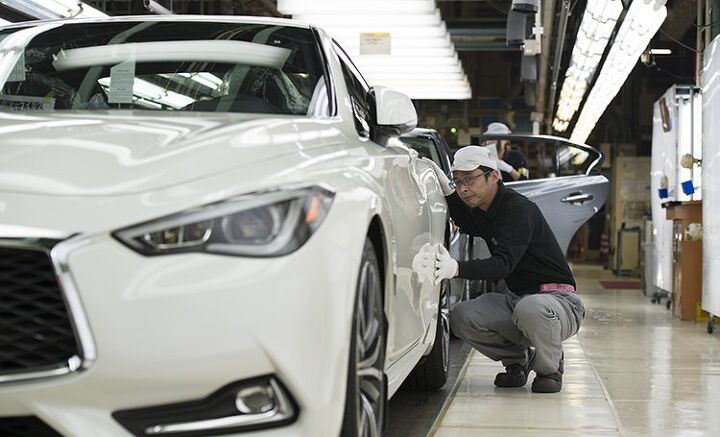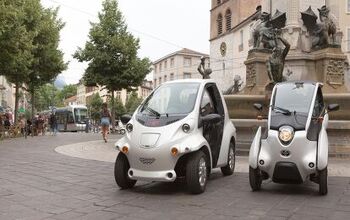Japan Readies Auto Industry for Coronavirus Complications

Yep, we’re still talking about the damned coronavirus. But how could we not, with the situation being obfuscated from all sides as the outbreak just seems to worsen? Both Japan and South Korea have reported their first deaths relating to the virus; meanwhile, the unsettling theory that 2019-nCoV was created in a Chinese laboratory has grown by leaps and bounds.
While the mainstream media has dismissed this as an unfounded conspiracy, loads of circumstantial evidence published by reputable sources leave one wondering. Our favorite is that the exotic meat market initially pegged as the disease’s point of origin was across the the street from (get this) a viral disease laboratory. Senator Tom Cotton (R-AR) has repeatedly pushed for the virus’ origin to be found, saying “We also know that just a few miles away from that food market is China’s only biosafety level 4 super laboratory that researches human infectious diseases,” only to be framed as an alarmist crank.
There was also a Chinese coverup (similar to SARS) that kicked off when police detained eight doctors in Wuhan for attempting to warn the public of a potential outbreak. The point here is that nobody seems ready to give (or even search for) answers in China. Naturally, this has left people confused and scared, rather than just scared.
The automotive industry is being thrashed by the outbreak as supply lines break down and Asian sales estimates fall into the gutter. Hoping to minimize the coronavirus’ impact, Japan has formed a joint council for automakers and suppliers to work with the government. The council’s primary goal is to ensure supply lines don’t break down while also serving as an early warning system for any industry-related outbreaks.
“Automakers, component manufacturers and the government must work together to ensure rapid response to the information on the industry, with a view to ensuring that measures can be taken to prepare for the possible impact of the new coronavirus on the automotive supply chain in the future,” explained the Japanese Ministry of Economy, Trade and Industry.
Announced Thursday, the group’s official name is the “ New Coronavirus Countermeasures Automobile Council” and comes after several noteworthy factory shutdowns related to virus-caused supply issues. Automotive News, which broke the story, provided a brief recap:
Nissan closed part of its production line in Kyushu, southwest Japan, on Feb. 14 and 17, and will also halt output on Feb. 24. Honda, Mazda, Mitsubishi and Toyota have halted some operations in China, although they haven’t yet had to do so in Japan due to parts shortages.
The coronavirus outbreak shuttered factories in China’s Hubei province and disrupted the supply of everything from transmissions to steering systems. The effect is being seen across the global auto industry.
Earlier this month, Hyundai and Renault suspended production in Korea, and Fiat suspended production of the 500L in Serbia, because of component shortages. Jaguar Land Rover has flown Chinese parts in suitcases to Britain to maintain production. Nissan said it may face stoppages at plants in Europe and the U.S.
Recent claims that the virus is gradually burning itself out, with infection rates slowly tapering off, may have been premature. As of Thursday, deaths reached 2,130 (out of 75,700 known cases). Considering China’s willingness to fudge numbers that cast the country in a bad light, the real figures could be higher. It’s probably a better idea to air on the side of caution and attempt to remain one step ahead, which the Japanese joint council plans on doing.
Useful in helping understand the complications born of the outbreak, the effort will also help the auto industry plan around any unpleasant surprises (likely requiring several manufacturers to source parts outside of China). It’s also telling that the Land of the Rising Sun is taking the coronavirus seriously enough to create an industrial coalition that’s entirely devoted to combating it. The crisis doesn’t look anywhere near over and, judging by the existence of the New Coronavirus Countermeasures Automobile Council, Japan feels similarly.
[Image: Nissan]

A staunch consumer advocate tracking industry trends and regulation. Before joining TTAC, Matt spent a decade working for marketing and research firms based in NYC. Clients included several of the world’s largest automakers, global tire brands, and aftermarket part suppliers. Dissatisfied with the corporate world and resentful of having to wear suits everyday, he pivoted to writing about cars. Since then, that man has become an ardent supporter of the right-to-repair movement, been interviewed on the auto industry by national radio broadcasts, driven more rental cars than anyone ever should, participated in amateur rallying events, and received the requisite minimum training as sanctioned by the SCCA. Handy with a wrench, Matt grew up surrounded by Detroit auto workers and managed to get a pizza delivery job before he was legally eligible. He later found himself driving box trucks through Manhattan, guaranteeing future sympathy for actual truckers. He continues to conduct research pertaining to the automotive sector as an independent contractor and has since moved back to his native Michigan, closer to where the cars are born. A contrarian, Matt claims to prefer understeer — stating that front and all-wheel drive vehicles cater best to his driving style.
More by Matt Posky
Latest Car Reviews
Read moreLatest Product Reviews
Read moreRecent Comments
- Kjhkjlhkjhkljh kljhjkhjklhkjh A prelude is a bad idea. There is already Acura with all the weird sport trims. This will not make back it's R&D money.
- Analoggrotto I don't see a red car here, how blazing stupid are you people?
- Redapple2 Love the wheels
- Redapple2 Good luck to them. They used to make great cars. 510. 240Z, Sentra SE-R. Maxima. Frontier.
- Joe65688619 Under Ghosn they went through the same short-term bottom-line thinking that GM did in the 80s/90s, and they have not recovered say, to their heyday in the 50s and 60s in terms of market share and innovation. Poor design decisions (a CVT in their front-wheel drive "4-Door Sports Car", model overlap in a poorly performing segment (they never needed the Altima AND the Maxima...what they needed was one vehicle with different drivetrain, including hybrid, to compete with the Accord/Camry, and decontenting their vehicles: My 2012 QX56 (I know, not a Nissan, but the same holds for the Armada) had power rear windows in the cargo area that could vent, a glass hatch on the back door that could be opened separate from the whole liftgate (in such a tall vehicle, kinda essential if you have it in a garage and want to load the trunk without having to open the garage door to make room for the lift gate), a nice driver's side folding armrest, and a few other quality-of-life details absent from my 2018 QX80. In a competitive market this attention to detai is can be the differentiator that sell cars. Now they are caught in the middle of the market, competing more with Hyundai and Kia and selling discounted vehicles near the same price points, but losing money on them. They invested also invested a lot in niche platforms. The Leaf was one of the first full EVs, but never really evolved. They misjudged the market - luxury EVs are selling, small budget models not so much. Variable compression engines offering little in terms of real-world power or tech, let a lot of complexity that is leading to higher failure rates. Aside from the Z and GT-R (low volume models), not much forced induction (whether your a fan or not, look at what Honda did with the CR-V and Acura RDX - same chassis, slap a turbo on it, make it nicer inside, and now you can sell it as a semi-premium brand with higher markup). That said, I do believe they retain the technical and engineering capability to do far better. About time management realized they need to make smarter investments and understand their markets better.


































Comments
Join the conversation
"The virus will reduce inventory and manufacturers will hold margin for the next six months." Exactly! I'm pretty sure the Covid-2019, sick of the name Coronavirus, will be affecting production here at the Nissan plant in Smyrna Tn., producing too many vehicles that aren't selling like in 1999! "Say say two thousand zero zero party over, oops, out of time So tonight I'm gonna party like it's nineteen ninety-nine" ( Prince )
For GM and Nissan this is a good excuse to idle their plants. Both are over producing vehicles giving both time to work their inventories of unsold vehicles down. It also would give both time to eliminate some of their slower selling vehicles. GM's botch job on the new Silverado and Nissan's Jatco transmissions and less than stellar Titan are hurting both.